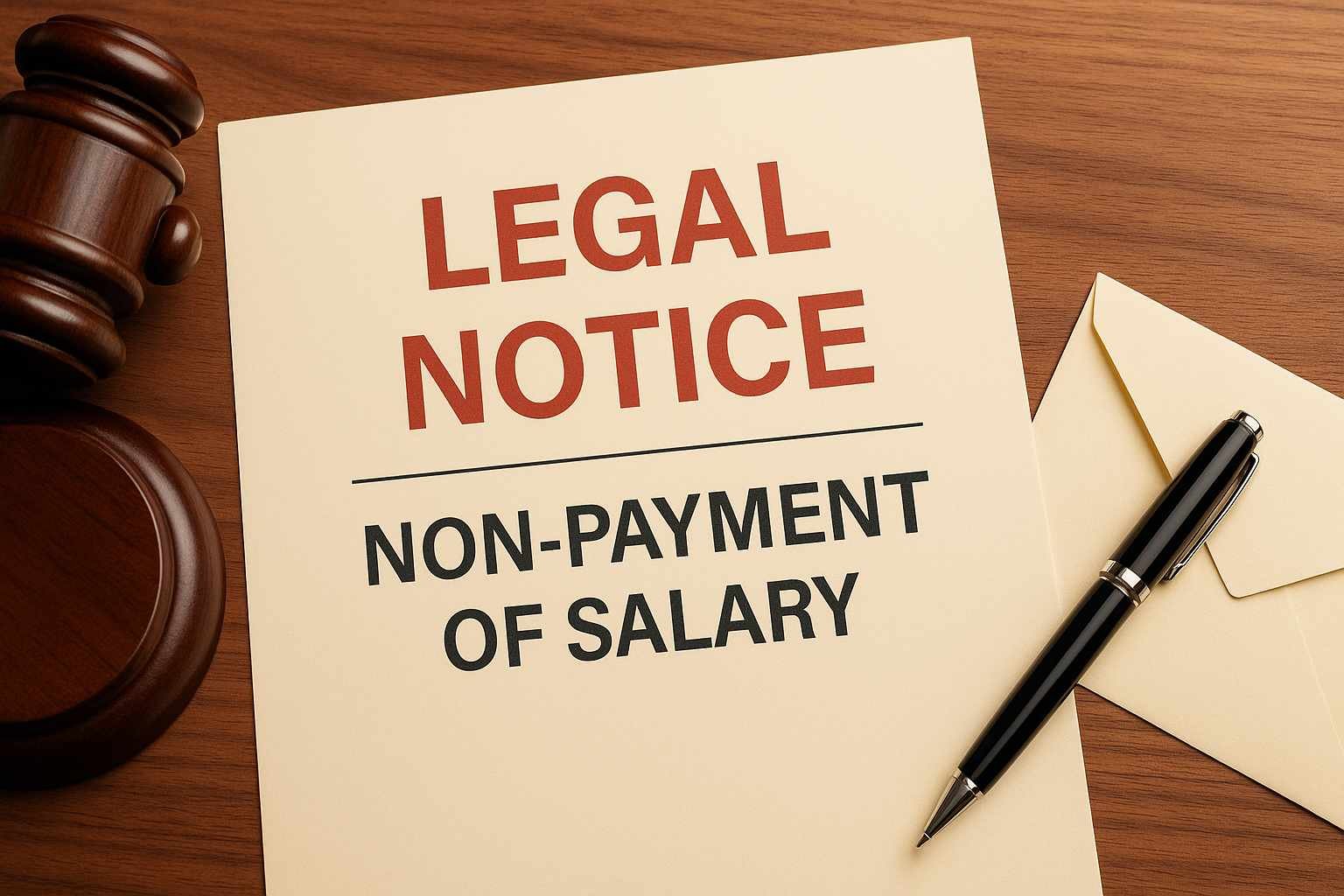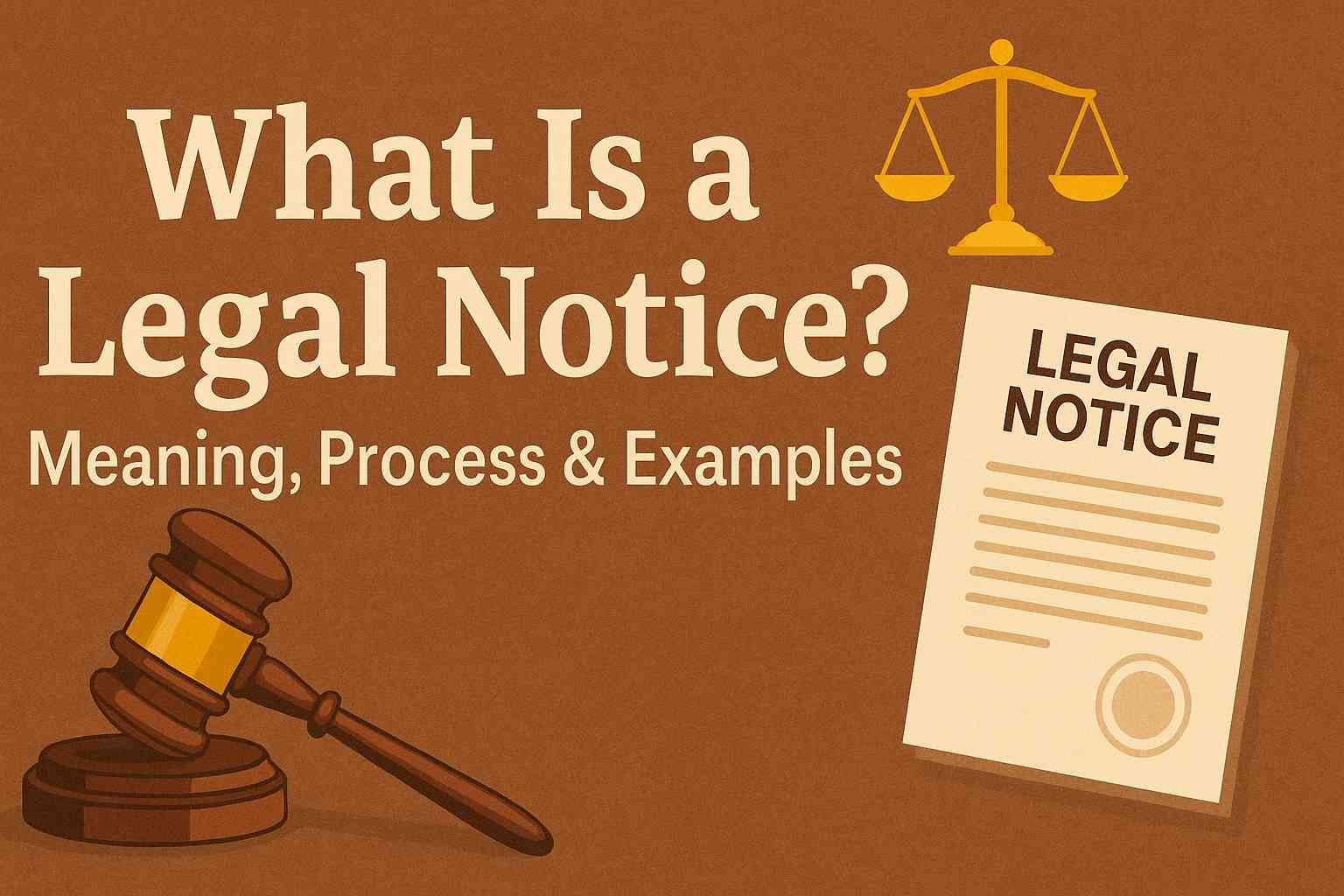On this page you will read detailed information about How to Send a Legal Notice for Non-Payment of Salary to Employer/Company.
Salary is not just a payment — it’s the financial lifeline that sustains an employee’s livelihood and dignity. Unfortunately, cases of salary delays or non-payment are not uncommon in India, especially in startups, small enterprises, or financially stressed companies.
When polite reminders and HR emails don’t work, sending a formal legal notice becomes the most effective and professional way to demand your rightful dues.
This article explains, step by step, how to send a legal notice to your employer for non-payment of salary, your rights under Indian law, and what to do if the company still fails to pay after receiving the notice.
1. Understanding Your Right to Salary
Under Indian law, salary is a legal and contractual right of every employee.
Employers are obligated to pay wages on time as per:
- The Payment of Wages Act, 1936
- The Industrial Disputes Act, 1947
- The Shops and Establishments Acts (State-specific)
- The Code on Wages, 2019 (effective 2022)
- The Indian Contract Act, 1872
Key Legal Points:
- Salaries must be paid before the 7th or 10th day of the following month (depending on establishment size).
- Any delay beyond one month without a valid reason is a violation of wage laws.
- Unpaid salary qualifies as a recoverable debt, giving the employee the right to seek legal recourse or compensation.
2. When Can You Send a Legal Notice?
You can issue a legal notice to your employer or company in the following cases:
- Non-payment of salary for one or more months without a valid reason.
- Partial payment or illegal deduction in wages.
- Non-payment of final settlement after resignation or termination.
- Unpaid bonuses, commissions, or incentives promised under the contract.
- Non-issuance of relieving letter or experience certificate due to unpaid dues.
Before sending a notice, always document your communication attempts — such as emails to HR, salary slips, offer letter, appointment letter, and bank statements. These serve as crucial evidence later.
3. Importance of Sending a Legal Notice
A legal notice is a formal communication drafted by a lawyer, warning the employer of potential legal action if payment is not made within a specified period (usually 7–15 days).
It serves three purposes:
- Acts as a final demand before legal proceedings.
- Demonstrates your serious intent and professionalism.
- Provides a record of pre-litigation communication, which courts often consider favorably.
In most cases, a properly worded legal notice is enough to prompt employers to settle dues without court intervention.
4. Legal Provisions Supporting Salary Recovery
Here are the legal frameworks employees can rely on:
(a) Payment of Wages Act, 1936
Applicable to employees earning below ₹24,000 per month (in some states, higher thresholds apply).
You can approach the Labour Commissioner if your salary is unlawfully withheld.
(b) Industrial Disputes Act, 1947
Covers “workmen” (non-managerial employees).
The law empowers employees to file a complaint before the Labour Court or Industrial Tribunal for recovery of unpaid wages and compensation.
(c) Contract Act, 1872
If you’re not covered under labour laws (e.g., a managerial or executive role), your employment agreement is governed by contract law.
In such cases, a civil suit for breach of contract or recovery of dues can be filed in court.
(d) Code on Wages, 2019
Now consolidates multiple wage laws under one framework.
Employers who delay salary payments can face penalties, interest, and prosecution under this code.
5. Step-by-Step Guide to Sending a Legal Notice
Let’s go through the practical steps of sending a legal notice for salary non-payment in 2025.
Step 1: Gather Evidence
Collect all documents that prove:
- You were employed with the company.
- Your salary amount and payment terms.
- Communication regarding unpaid salary.
- Proof of partial or delayed payments (if any).
Common evidence includes:
- Offer or appointment letter
- Salary slips or bank statements
- Employment ID or company emails
- Resignation/termination letters
- Any acknowledgment from HR or management
Step 2: Consult a Legal Professional
While individuals can send notices themselves, a lawyer-drafted notice carries greater legal weight.
Consult an employment or labour law advocate — they will:
- Draft a formal notice citing relevant laws.
- Specify the claim amount and payment deadline.
- Warn the employer of potential legal action (civil, criminal, or labour court).
Typical lawyer fees for drafting such notices range between ₹1,000 to ₹5,000, depending on the complexity.
In the previous post, we had shared information about What happens to the Employees of an Insolvent/bankrupt company?, so read that post also.
Step 3: Drafting the Legal Notice
A well-drafted legal notice should include:
- Your details: Full name, designation, and contact information.
- Employer’s details: Company name, address, and authorized representative (HR, director, or CEO).
- Employment details: Date of joining, last working date, and agreed salary.
- Statement of non-payment: Duration and amount of unpaid salary.
- Legal grounds: Reference to applicable laws such as the Payment of Wages Act, Code on Wages, or Contract Act.
- Demand: Specific request for full payment within a fixed period (usually 7–15 days).
- Consequence: Warning of filing a case before the Labour Commissioner or civil court if not paid.
Step 4: Send the Notice
You can send the notice through:
- Registered Post with Acknowledgment Due (RPAD)
- Speed Post
- Email (with delivery proof)
Always retain:
- The copy of the notice,
- Postal receipt, and
- Acknowledgment card (if received).
These will serve as crucial proof in any legal proceeding.
Step 5: Wait for the Employer’s Response
Most companies respond within 7–15 days, especially if they wish to avoid litigation.
If they:
- Agree to pay → Settle in writing and ensure payment is received.
- Deny the claim → You may proceed to the next legal step (labour court or civil suit).
6. What If the Employer Doesn’t Respond?
If your employer ignores or refuses to comply after receiving the legal notice, you have the following options:
(a) File a Complaint with the Labour Commissioner
Applicable if you are a non-managerial employee.
You can approach the Labour Commissioner’s office in your district or file a complaint online on the Shram Suvidha Portal (https://shramsuvidha.gov.in).
The Commissioner will summon the employer and attempt conciliation.
If unresolved, the case may proceed to the Labour Court.
(b) File a Civil Suit for Recovery
If you are in a managerial, supervisory, or contractual role, you can file a civil recovery suit in a court of competent jurisdiction under Order 37 of the Civil Procedure Code (CPC).
This is typically used for enforcing monetary claims.
(c) File a Complaint under Section 406 or 420 IPC
In extreme cases involving malicious intent or fraud, you can file a criminal complaint under:
- Section 406 (Criminal Breach of Trust)
- Section 420 (Cheating) of the Indian Penal Code, 1860
However, this route is advised only when there is clear evidence of deliberate cheating or misrepresentation.
7. Format Example of a Legal Notice (Illustrative)
To,
The HR Manager / Director
[Company Name]
[Company Address]Subject: Legal Notice for Non-Payment of Salary
Dear Sir/Madam,
I was employed with your organization as [designation] from [joining date] to [last working date]. Despite multiple reminders, my salary for the period [month(s)] amounting to ₹[amount] remains unpaid.
Your actions constitute a violation of the Payment of Wages Act, 1936 and the Code on Wages, 2019.
I hereby demand payment of my full dues within 7 days of receipt of this notice, failing which I will be compelled to initiate appropriate legal proceedings at your cost and risk.
Yours sincerely,
[Your Name]
[Address]
[Date]
8. Practical Tips
- Always remain professional in tone — avoid threats or emotional language.
- Do not resign in anger before receiving dues (if still employed).
- Keep all communication in writing.
- Avoid posting grievances on social media — it can weaken your legal standing.
- If multiple employees are affected, consider collective legal action for stronger impact.
9. Resolution Timeline
- Legal notice response period: 7–15 days
- Labour Commissioner process: 1–3 months
- Civil court recovery (if required): 3–12 months, depending on case complexity
Most cases, however, are resolved within weeks of receiving a well-drafted notice.
Conclusion
A legal notice for non-payment of salary is a legitimate and effective way to assert your rights and demand what you are owed. It signals professionalism, preserves your evidence, and often compels employers to act promptly.
If the employer still refuses, you have multiple legal remedies — from the Labour Commissioner to civil court and even criminal prosecution in severe cases.
Ultimately, timely salary payment is not a favor — it’s a legal obligation and a fundamental employee right. With the right approach and awareness of your rights under Indian law, you can ensure justice, dignity, and financial fairness in your workplace.
Disclaimer
The information and services on this website are not intended to and shall not be used as legal advice. You should consult a Legal Professional for any legal or solicited advice. While we have good faith and our own independent research to every information listed on the website and do our best to ensure that the data provided is accurate. However, we do not guarantee the information provided is accurate and make no representation or warranty of any kind, express or implied, regarding the accuracy, adequacy, validity, reliability, availability, or completeness of any information on the Site. UNDER NO CIRCUMSTANCES SHALL WE HAVE ANY LIABILITY TO YOU FOR ANY LOSS OR DAMAGE OF ANY KIND INCURRED AS A RESULT OR RELIANCE ON ANY INFORMATION PROVIDED ON THE SITE. YOUR USE OF THE SITE AND YOUR RELIANCE ON ANY INFORMATION ON THE SITE IS SOLELY AT YOUR OWN RISK. Comments on this website are the sole responsibility of their writers so the accuracy, completeness, veracity, honesty, factuality and politeness of comments are not guaranteed.
So friends, today we talked about How to Send a Legal Notice for Non-Payment of Salary to Employer/Company, hope you liked our post.
If you liked the information about How to Send a Legal Notice for Non-Payment of Salary to Employer/Company, then definitely share this article with your friends.
Knowing about laws can make you feel super smart ! If you find value in the content you may consider joining our not for profit Legal Community ! You can ask unlimited questions on WhatsApp and get answers. You can DM or send your name & number to 8208309918 on WhatsApp









